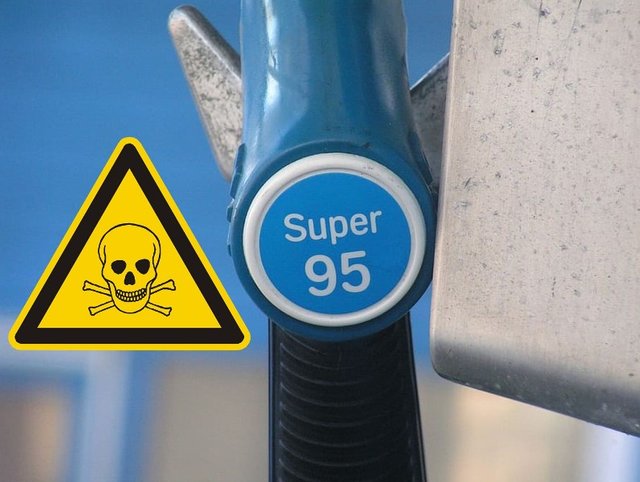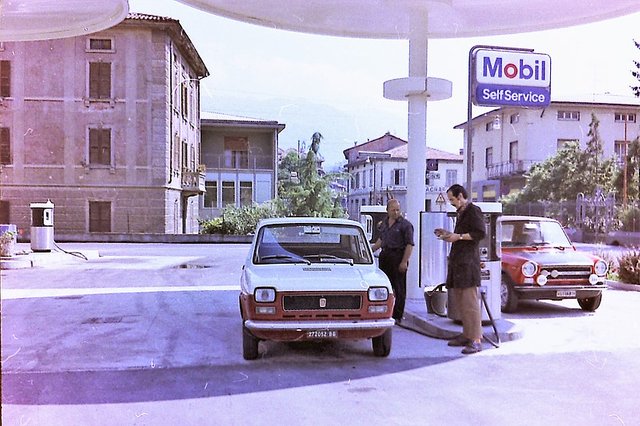The era of leaded gasoline ends after nearly a century of use
Perhaps many consider that the use of leaded gasoline was a thing of the past, since in many countries its elimination from the market took place during the 80s and 90s of the last century, for others however the memory is more recent, countries like Venezuela, Italy and Spain were still among the few that eliminated it completely between 2000 and 2005, after a hard campaign of the UN that lasted decades; but despite this, in very few countries still continued its use.

Almost a century of distributing this poisonous fuel. Source: Edited image, original from piqsels.com.
It was not until August 2021 that Algeria became the last country to veto the sale of leaded fuels, and thus, almost 100 years after its implementation, the world finally managed to end the production of leaded gasoline, finally eliminating a terrible threat to health and the environment, although not without leaving its mark.
A bit of history
Let us remember that lead was added to gasoline to improve engine performance, it was added as tetraethyl lead, this compound was first used in gasoline in 1922 as an octane enhancer, which allowed to improve the compression of combustion engines.

Tetraethyl lead was added as an antiknock agent in gasoline. Source: Wikimedia Commons.
Tetraethyl lead was chemically identified in the mid-19th century, its preparation forms are attributed to two chemists, on the one hand Karl Jacob Löwig who reported in 1853 having prepared Pb2(C2H5)3 from ethyl iodide and a lead and sodium alloy, and on the other, George Bowdler Buckton obtained in 1859 Pb(C2H5)2 from ethyl zinc (Zn(C2H5)2) and lead chloride. But it was not used as a gasoline component until 1921, when in the laboratories of General Motors, where an efficient and economical anti-knock additive was being sought, it was tested to improve fuel and prevent accelerated engine valve wear.
In 1924, shortly after starting its production in a Standard Oil plant in New Jersey, USA, there was an outbreak of neuropsychiatric diseases among the plant workers, 80% had seizures and five died; despite strong warnings about the health effects, after improving conditions in the plant, production was resumed.
By the 70's all gasoline had lead, despite other options that offered similar anti-knock effects in gasoline, such as alcohol, the oil companies managed to get away with it despite the risks, simply because it was cheaper and because of the lack of solid evidence, thus, Standard Oil, General Motors and DuPont, three giants of the American economy quickly incorporated this additive in the market. By the 1970s in the United States alone, annual gasoline consumption included almost 200,000 tons of lead.

In the 1970s, almost all gasoline in the world contained lead. Source: Wikimedia commons.
Finally, with decades of research, some of which linked the increase in violent crime to the spread of lead in the air, in the 1970s the United States began to place higher taxes on leaded gasoline and even banned its use with the signing of the Clean Air Act. Two decades later, a decrease in the violent crime rate began to be perceived.
By the 1980s almost all developed countries had banned the sale of leaded gasoline at their service stations, but by 2000 many developing countries were still marketing leaded gasoline. By 2013 Algeria, Yemen and Iraq were the last to sell leaded gasoline, until finally this year Algeria was the last country in the world to use lead in its gasoline.
Why do we allow decades of lead?
Lead is a very toxic metal to the body, there is even no low level that is considered safe, it is something that even the Romans knew, back then lead was used to make pipes, they noticed that lead miners often went mad and died, but something that did not bother them as they were slaves. However, two thousand years ago Vitruvius, a civil engineer of the time, wrote that clay pipes were safer, that it was unwise to expose oneself to low levels of this metal.
If it was a fact, at least moderately known, the question remains why we allow so much lead contamination, the defenders of this type of fuels argued that it was safe, that it would be almost impossible to detect its concentration in the environment, but the evidence was accumulating against them.
And well, we already have enough evidence that while there are interests involved, and countries are developing, they tend to pollute more, and when they reach a certain level of pollution that already harms them, their concern for the environment begins.
So we must always ask ourselves: How much pollution will we allow for the sake of progress?
Thanks for coming by to read friends. See you next time.

Greetings friend @emiliomoron no doubt the era of leaded gasoline was one of the triggers to achieve a breakthrough in a process of industrialization, however the risks to health and the environment were very high.
I applaud the idea that new and different alternatives have been taken in the manufacture of this useful fuel. Great contribution, greetings.
Greetings friends, that's right, the use of an anti-knock agent such as tetraethyl lead managed to improve the performance of fuels and boost development, but certainly the price for health was very high and other alternatives could be explored.
Greetings @emiliomoron, the issue of leaded gasoline is difficult to assume because the use that was given to this fuel undoubtedly improved the means of vehicular transport, but brought with it very serious consequences on the health issue, which is why one of the reasons for its abolition is the health of those who worked with this fuel.
That's right my friend @carlir, it improved the power and performance of the vehicles, but the cost to health was too high.
Hello @emiliomoron
With gasoline it has happened as with mercury, which has medicinal use. That it has been used for so long, for example in thermometers.
But look, good data that of associating the increase in crime with the presence of lead in the air, it is quite likely that there is a relationship.
Hi @josevas217, I guess it is a similar case, mercury is another metal widely used in several areas, such as the medical industry. Lead attacks the nervous system and causes many mental disorders, maybe in another article I can address more about this relationship with the increase in violence.
This is good news for this world and especially for humans who somehow were in contact with this type of gasoline, all the damage it did after combustion inside gasoline engines, all that lead went up to the clouds as smoke and then with the rains was returned to the earth to pollute everything. Especially the rivers
We making discoveries, then we remove it because we have evidence of the effect on the human body.
That's right my friend, it is very common that we make a breakthrough for the development of society and then we find its effects on health and the environment, research should cover all these edges before implementing any product on a massive scale.
This topic is very interesting especially because even when leaded gasoline is no longer used, the damages and consequences to the environment and our life on the planet are really costly and alarming. The use of this gasoline beyond the ignorance of those who implemented it had to do with the campaign by the big oil industries that used this chemical component as a way to make more powerful and much more durable performance of the engines of vehicles even General Motors itself had to do in the use and popularity in their vehicles of this type of fuel which generated investigations that ended up being fixed with unconventional methods. But that is part of the history of pollution and human abuse of the planet, hopefully we can achieve a real transformation and ecological awareness but now the discussion is in the problems generated by the fuel used by spacecraft that venture into space tourism, perhaps our colleague @emiliomoron as a chemist or other of our brilliant talents of PH can explain how this new era will affect us.
Hi @emimoron, no doubt the damage caused by the use of this compound in gasoline is still perceived and will be felt for a long time, and certainly the big industries had much to do in this, although it was already known that some alcohols could be used for this purpose were not considered because they were more expensive and could not be patented. Some time ago I wrote about the carbon footprint of spacecraft, maybe I will go deeper into the type of fuel.